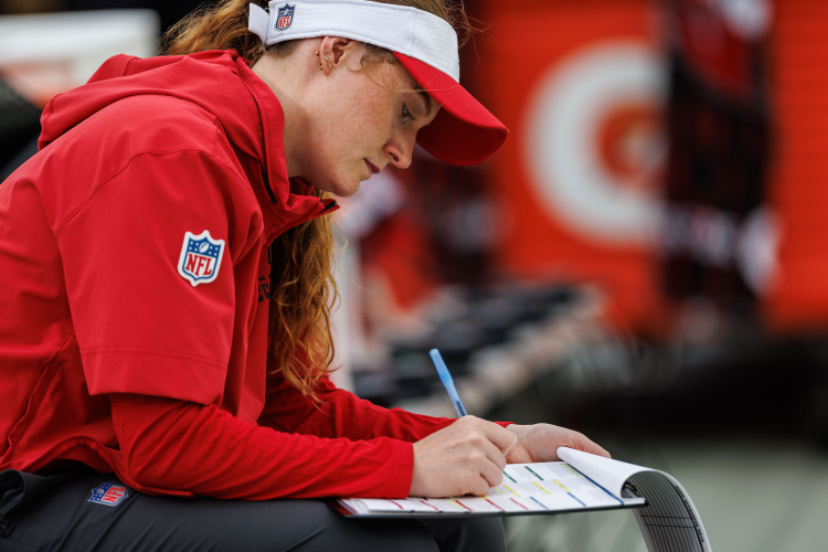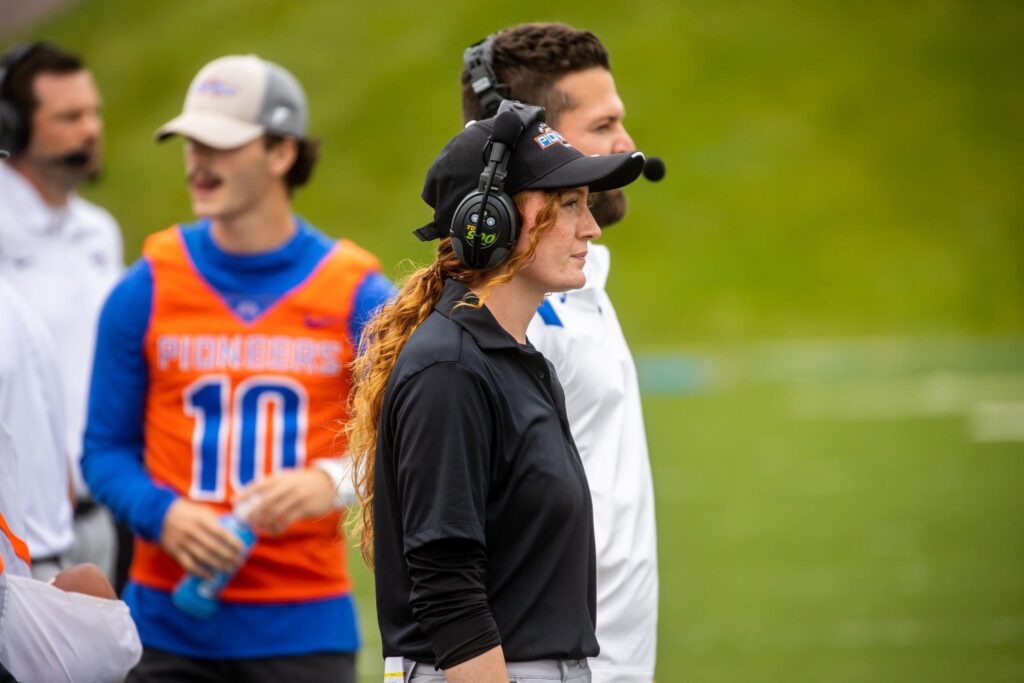Baseball may be referred to as “America’s favorite pastime,” but according to the Pew Research Center, it is football that is considered by many to be “America’s sport.” Despite this, approximately half of the United States’ population is left out of the sport completely. Women aren’t well represented in NCAA football programs or the NFL, but the industry is moving toward including more women in the sport.
Kearstin Schweitzer, the current running backs coach for Valparaiso University in Indiana and former assistant wide receiver coach for the UW–Platteville Pioneers is gaining yards. While working at UW–Platteville, Schweitzer was the football program’s first female coach, paving the way for other women interested in college coaching. Schweitzer’s journey and job experience as a woman in this role is not only unique but also deserving of recognition.
What initially led you to pursue coaching football?
I knew I wanted to work in football in some capacity once I got to college. However, I thought it was going to have to be in a supporting role like athletic training or strength and conditioning. The coaching progression came naturally once I started working with the football team at Lakeland all year round.

What team made you fall in love with football and why?
The Carolina Panthers were the first football team that I dubbed as my favorite team. This was during the Cam Newton era, when they had Greg Olson, Luke Kuehcly, then later, Christian McCaffery, and the head coach was Ron Rivera.
You received both your bachelor’s and your master’s in athletic administration. How did your education help prepare you for your career on the field?
My athletic administration degrees have helped prepare me for this career field by allowing me to learn how an athletic department works. There is a lot more that goes into being a college coach than just coaching, and so having my education in athletic administration has given me an advantage. I am more aware and prepared for the extra responsibilities that come with this profession.
As a female in a typically male-dominated industry, what challenges, if any, did you face in breaking into coaching?
The initial challenge was understanding the game without ever playing the sport, but with film study and observations I have been able to overcome that challenge. The next one would be the communication piece with the athletes, but as long as you can “talk ball” with them, that challenge gets eliminated. The most obvious one is being the only female in the room and the first female at a program. There is always an initial learning curve that happens when you’re the first female coach at a program, but with the right communication, those challenges are easily overcome.
You’ve worked with such professional football teams as the NFL’s Pittsburgh Steelers, as well as such collegiate teams as the UW–Platteville football program. What did you enjoy most about each of those playing levels?
At the professional level, I enjoyed how well prepared everything is and how locked in the entire organization is. The biggest difference is there is a much higher level of professionalism that is present, both on and off the field. At the collegiate level, the most enjoyable part is that not only are you coaching young men on the field, but you are also coaching them to become great professionals and people.

At UW–Platteville, you were the first female coach for the program, working your way up from managing duties to recruiting at Lakeland University to eventually becoming the director of football operations and assistant wide receivers coach for the Pioneers. What lessons did you learn from those initial roles at Lakeland University that guided you towards a coaching role?
The most important lesson I learned is to be able to do everything and learn from everyone. I wore a lot of hats throughout my time at Lakeland, and each hat added to my skill set within a football program. Being able to help in any capacity makes you valuable in any program. I also made it a priority to sit in other coaches’ offices and ask questions so that I was learning more than just the position I was coaching.
What advice would you offer to young women looking to enter the world of coaching or sports in general?
My advice for young women looking into entering the coaching profession is to truly be yourself. Do not be afraid to ask questions and speak up when you have something to say. You are valuable, you are capable and you belong in the profession if you love it!
This email conversation was edited for clarity and brevity.
Cover photo: Kearstin Schweitzer talking to a football player. Photo courtesy of Kearstin Schweitzer.
Tile photo: Kearstin Schweitzer looking out onto the field. Photo courtesy of Kearstin Schweitzer.
Published on Dec. 9, 2024